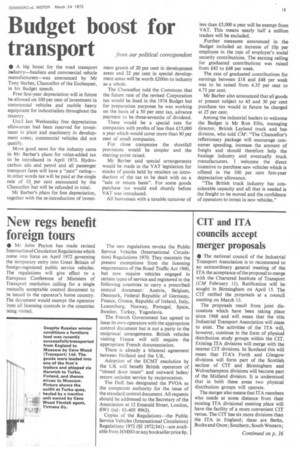Budget boost for
Page 17

If you've noticed an error in this article please click here to report it so we can fix it.
transport from our political correspondent
• A big boost for the road transport imdustry—hauliers and commercial vehicle manufacturers—was announced by Mr Tony Barber, Chancellor of the Exchequer, in his Budget speech.
Free first-year depreciation will in future be allowed on 100 per cent of investment in commercial vehicles and mobile heavy equipment for industrialists throughout the country.
Until last Wednesday free depreciation allowances had been reserved for investment in plant and machinery in development areas; commercial vehicles did not qualify. ify,
More good news for the industry came in Mr Barber's plans for value-added tax to be introduced in April 1973. Hydrocarbon oils and petrol and all passenger transport fares will have a "zero" rating— in other words tax will be paid at the single rate of 10, per cent announced by the Chancellor but will be refunded in total.
Mr Barber's plans for free depreciation, together with the re-introduction of invest
ment grants of 20 per cent in development areas and 22 per cent in special development areas will be worth £200m to industry as a whole.
The Chancellor told the Commons that the future rate of the revised Corporation tax would be fixed in the 1974 Budget but for preparation purposes he was working on the basis of a 50 per cent tax, advance Payment to be three-sevenths of dividend.
There would be a special rate for companies with profits of less than £15,000 a year which would cover more than 90 per cent of small companies.
For close companies the shortfall provisions would be simpler and the starting point raised.
Mr Barber said special arrangements would be made in the VAT legislation for stocks of goods held by retailers on introduction of the tax to be dealt with on a "sale or return basis". For some goods purchase tax would end shortly before VAT was introduced.
All businesses with a taxable turnover of less than £5,000 a year will be exempt from VAT. This means nearly half a million traders will be excluded.
Further measures announced in the Budget included an increase of lop per employee in the rate of employer's social security contributions. The earning ceiling for graduated contributions was raised from £42 to £48 per week.
The rate of graduated contributions for earnings between £18 and £48 per week was to be raised from 4.35 per cent to 4.75 per cent.
Mr Barber also announced that all goods at present subject to 45 and 30 per cent purchase tax would in future be charged at 25 per cent.
Among the industrial leaders to welcome the Budget is Mr Ron Ellis, managing director, British Leyland truck and bus division, who told CM: "The Chancellor's reflationary package will encourage consumer spending, increase the amount of freight and should therefore help the haulage industry and eventually truck manufacturers. I welcome the direct incentive to purchase new vehicles which is offered in the 100 per cent first-year depreciation allowance. •
"The British truck industry has considerable capacity and all that is needed is the freight to be moved and the confidence of operators to invest in new vehicles."




















































































































































